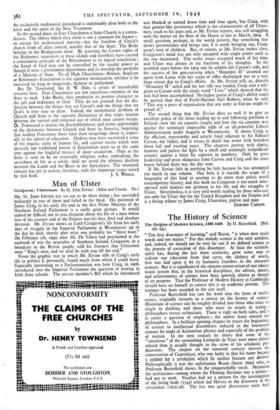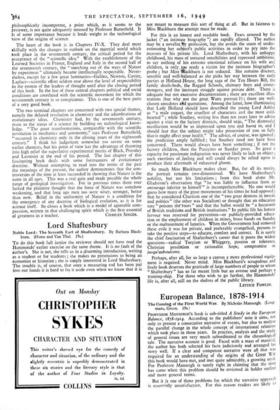The History of Science
The Origins of Modern Science, 1300-1600. By H. Butterfield. (Bell. 10s. 6d.)
" THE first distemper of learning," said Bacon, " is when men study words and not matter." For this malady science is the only antidote, and, indeed, we should not be very far out if we defined science as the process of correction of this distemper. At least the scientific spirit has, during the last three centuries, gone some way to redeem our education from that curse, the idolatry of words, that was laid upon it by its humanist founders in the sixteenth century. But it is significant of the extreme conservatism of our educa- tional system that, in the historical disciplines, the advent, nature, and achievements of science have been ignored, almost as though of set purpose. That the Professor of Modern History at Cambridge should have set himself to correct this is an academic portent. The trumpet has been sounded in the city itself. Professor Butterfield has cast his work into the form of twelve essays, originally lectures in a course on the history of science. Historians of science can be roughly divided into those who trace its origin in thinking and those who trace its origin in trying— philosophers versus technicians. There is right on both sides, and It is rather a question of emphasis ; the author leans toward the philosophers. In a brilliant opening chapter he traces the beginning, of science to intellectual discomforts induced in the fourteenth century by study of Aristotelian physics and especially of the problem of motion. In the next century he shows that some of the " intuitions " of the astonishing Leonardo da Vinci were more closely related than is usually thought to the views of his scholastic pre- decessors. The chapter on the sixteenth century stresses the conservatism of Copernicus, who was lucky in that his name became a symbol for a revolution which he neither foresaw nor desired. Philosophically it was the unfortunate Bruno (burnt x6o0) who, as Professor Butterfield shows, lit the unquenchable torch. Meantime the technicians—among whom the Fleming Stevinus was a prince— had got to work. Vesalius had set a pattern for the investigation of the living body (5543) which led Harvey to the discovery of the circulation (1616-28). The last two great discoverers were both
philosophically incompetent, a point which, as it seems to the reviewer, is not quite adequately stressed by Professor Butterfield. It is of some importance because it lends weight to the technological View of the origins of science.
The heart of the book is in Chapters IV-X. They deal most skilfully with the changes in outlook on the material world which took place in the seventeenth century, the critical period for the acceptance of the " scientific idea." With the establishment of the Learned Societies in France, England and Italy in the second half of the seventeenth century, the " searching out of the ways of Nature by experiment " ultimately became intellectually respectable. Never- theless, except for a few great luminaries—Galileo, Newton, Cuvier, Laplace—scientific effort seldom rose above the level of respectability in the esteem of the leaders of thought until after the closing period of this book. In the last of these central chapters political and social conditions are correlated with the scientific movement for which the seventeenth century is so conspicuous. This is one of the best parts of a very good book.
The two terminal chapters are concerned with two special themes, namely the delayed revolution in chemistry and the adumbrations of evolutionary ideas. Chemistry had, by the seventeenth century, risen to the status of a science by building on technological know- ledge. "The great transformations, comparable with the scientific revolution in mechanics and astronomy," says Professor Butterfield, "occurred in chemistry only in the closing years of the eighteenth century." I think his judgement somewhat too severe on some earlier chemists, but his point of view has the advantage of throwing into high relief the superlative experimental merits of Black, Priestley and Lavoisier at the end of his period. The last chapter of this fascinating book deals with some forerunners of evolutionary doctrine. Without attempting to read into the terms of the past the meanings of the present, the author demonstrates that the con- troversies of the time at least succeeded in showing that Nature is the same in all ages. This was a real gain and made possible the whole range of geological investigation. For in previous times there ever lurked the plaintive thought that the force of Nature was somehow weakening, and that long ago men too were wiser, stronger, better than now. Belief in the uniformity of Nature is a condition for the emergence of any doctrine of biological evolution, as it is for science itself. So closes a book which is a model of agreeable com- pression, written in that challenging spirit which is the first essential



































 Previous page
Previous page